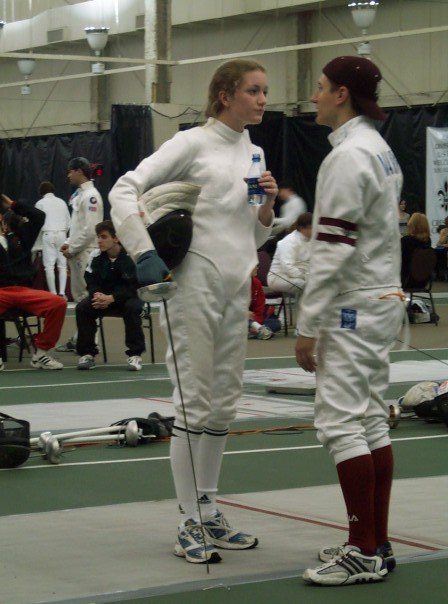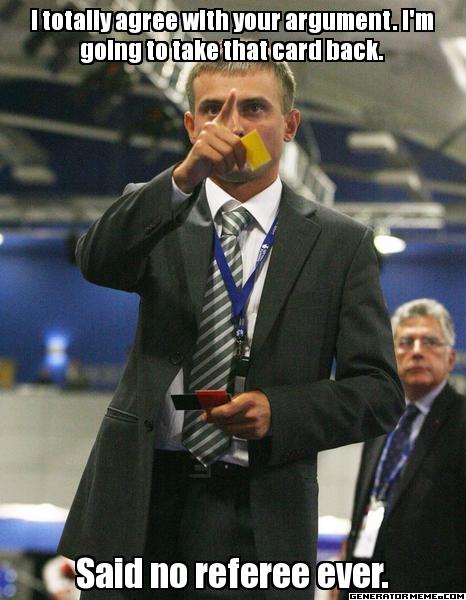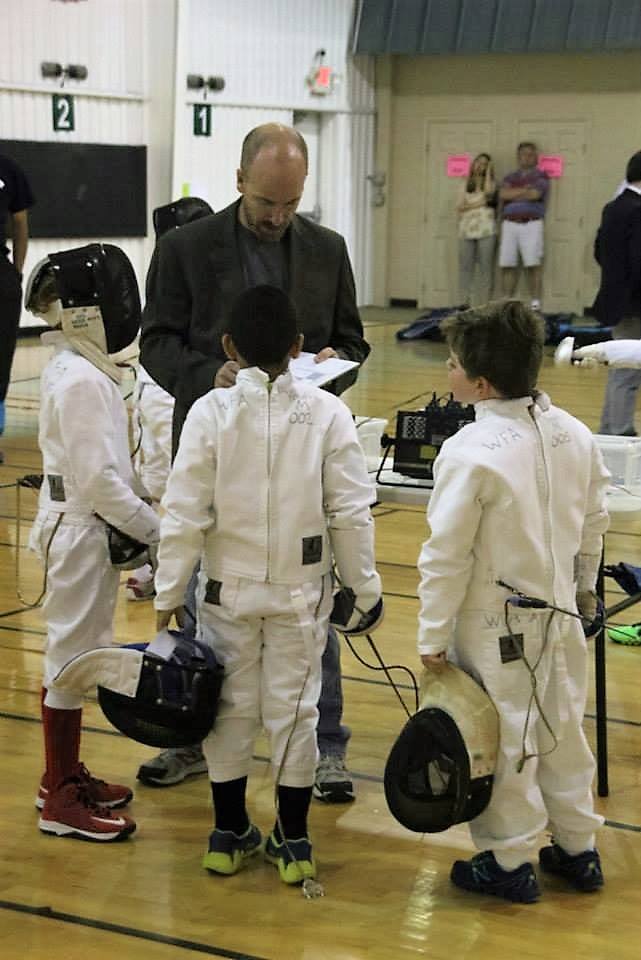Tournament Stories by Coach Liz

Getting some coaching from my then-boyfriend, now-husband David. I think this was the Crescent City, it would have been 2003 or so.
Coach Liz here. The 2016-2017 season is starting and it’s got me thinking about some of my favorite tournament stories. Here they are, for your enjoyment.
Non-Combativity in Women’s Epee – Tale as Old as 2003 or so
When I first got started I wasn’t good enough to be worthy of a rivalry with anybody, but I did come up against the same people a lot. There was one really great epeeist, we’ll call her Margaret (not her name), who was very tall, very strong, and fairly passive… until you tried to attack or something, and then she’d mow you down with this fleche that I couldn’t do anything about. At one tournament I realized that if I just didn’t attack, she wouldn’t fleche, so I could lose the bout with a shred of dignity and no bruises (give me a break, I was new). The joke was on me because they’d just introduced (reintroduced? decided to enforce?) non-combativity, so when we went a minute without doing anything we both got carded. Margaret thought it was on me to try to score so she shouldn’t have gotten penalized, but apparently not.
I lost that bout, are you surprised?
My First Rating
At another tournament, I fenced a DE bout against a fencer I’d never beaten before, but I was having a great day and won. I was very excited because I’d gotten into the top four, and earned my first rating, an E2005 (I think that was the year). I’d been fencing for three years at that point and had come close to earning a rating several times but never succeeded.[1] Just before my next bout, a semifinal, someone told me that the tournament was better than I’d thought and I’d actually just earned a D (which is better than an E). I was so shocked I forgot how to fence and lost the next bout. Oops.
Let the Ref Check your Stuff
A few years later, my first DE in the women’s event got pretty interesting. My opponent’s blade failed to register a touch pretty early in the bout. When she realized it wasn’t working, she began testing it herself to try to figure out where the problem was. This is a good idea during practice but a terrible idea during a tournament – if something is wrong with your weapon, you need to ask the referee to check it so that the ref knows you didn’t just deliberately sabotage your equipment. If the ref checks your equipment and finds that it’s broken, they will often annul your opponent’s last touch since clearly you couldn’t have scored. But if you check your own stuff, they will not annul the touch.
Well, the trick here is that it wasn’t her fault that her weapon had stopped working – the floor cord had come unplugged, all the way at the end of the strip, where she couldn’t have manipulated it. The ref decided not to annul my last touch because she had tested her own stuff, and the bout committee backed him. I have asked a lot of refs about this call in the years since, and most of them say my touch should have been annulled since she couldn’t have caused the issue. Whatever the correct call was, the ref made the call they made, and my opponent got furious.
She spent the rest of the bout getting increasingly frustrated with her inability to hit me. At the break my husband overheard her saying to her coach “I have never seen someone get so many lucky touches in my LIFE.” I wasn’t getting lucky touches, though. She was so mad that she was trying to hit me hard, whether consciously or subconsciously. Every time she attacked she’d pull her arm back and I’d neatly, lightly counterattack her arm. Then she’d slam into me with the force of a thousand suns (or a 110-lb teenage epee fencer) a split second after I’d already gotten the point. I began to get a little worried for my safety after one particularly savage blow to my knee (epee fencing tip: when you are mad and getting counterattacked, do not aim low, you only make their job easier). I walked away from that bout with about 12 bruises and a victory.
Time to Go!
Later in the same tournament, I ended up in priority. This means that the score was tied and we had run out of time. Priority in fencing means the referee tosses a coin and then you fence for one minute. If somebody gets a point, they win and the bout is over. If nobody gets a point, the winner of the coin toss wins the bout. I lost the coin toss, so my only path to victory was to hit this girl. We were fencing on a strip that had the clock displayed, and my opponent smartly maneuvered me to the point that I couldn’t see it. I wasn’t too concerned because I thought I had a pretty good idea of how long a minute lasts, so I was biding my time and waiting for the perfect moment. Well, I waited a bit longer than I meant to. I heard a few people start to yell “Go! Go!” and my husband said “Uh… Liz?” in the same tone he uses when I’ve forgotten something important like my keys on the way out the door. I realized this meant it was time to attack. So I lunged, and hit her, and turned around and there was one second left on the clock. Thanks for the coaching, honey!
Bad News, Good News
I won the next bout, too, and went to the final. I was fencing better that day than I ever had in my life, but that also means more fencing than I’d ever done in my life, and the fatigue was setting in, and I could barely hold my epee anymore. Sometime between the semifinal and the final I lost my glove. That was the bad news. The only glove we could find at that point was an old, stiff leather glove in size large. The good news was that because it was big and stiff, it actually helped me hold the epee. It felt like I had a little scaffold around my hand. With the help of that glove I won the final bout and earned my first individual gold medal.
A few months later I found out that one of my teammates had taken the glove home thinking it was his even though it had “Liz M” written on the cuff.
Want some stories of your own? Sign up for tournaments! The Cougar Call to Arms is coming up September 17-18 right here in Houston. Also, buy a 2017 calendar and then circle February 11, because that’s the second ever Brash Brewery Bash.
[1] You earn ratings by placing highly in a tournament of a certain size; the rating A-E depends on your placement and the size of the tournament, and the year you earned it in follows the letter.


